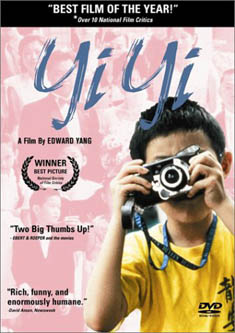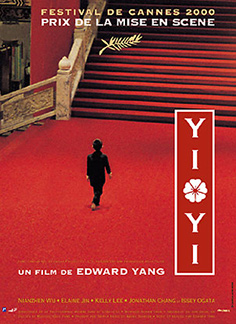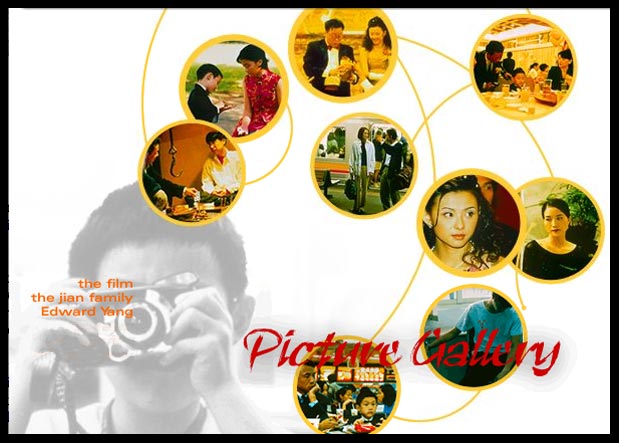Yi Yi: Both a One and a Two

This was the official website for the film, Yi Yi. It originally offered visitors a massive amount of information on the film, as well as pages on each of the characters and their place in the narrative, reviews, a Yang interview, filmography, a picture gallery and a lot more. The film was released in the US in 2001. It was the first runner up for the best foreign- language picture at the 2001 Oscars.
I happened to see the film one evening after a busy day visiting my vape store customers in California. I work for a company selling : wholesale vapor products online. The vape marketplace back then was a whole lot different than it is today. With the legalization of marijuana and the burgeoning medical marijuana market, along with the vaporizer market for e-liquids, vaping had become mainstream. Products were being advertised on tv. The market was exploding. But just as suddenly, as the negative health stories exploded in the press, the bottom fell out and the orders died. I was caught up in that. Early on we thought we could manage it. When Google's search results for our company started showing health warnings we countered with positive spin, more ads, more posts and tweets. And some of the posts in Google's results were actually bogus, made up stories obviously intended to harm us with disinformation. Our dev found a website that featured these kinds of Google problems, so we knew we were not alone. We spoke with a bunch of reputation management firms and heard estimates for removing those bad search results from Google's first page. As the health notices grew, the firms dropped out, apparently the job was getting too unwieldy with a high likelihood of failure. They sent us to this one shop that they often hired to remove search results for their clients that exclusively handled search removals. The industry considered this option, but it was costly and the public tide was turning. It's still painful, the memory of this industry collapsing always brings me down but going to a movie in the evening always perked me up. YiYi was just the ticket.
Yi Yi brought Edward Yang the Best Director award at the 2000 Cannes Film Festival. Subsequently the film was celebrated equally by mainstream critics and the more stringent highbrow critics. The National Society of Film Critics awarded it Best Picture, while the Village Voice poll of 54 critics placed Yi Yi in second place among the films of 2000. Despite high acclaim for Yang’s previous seven pictures, Yi Yi is shockingly the first of Yang’s films to get a commercial run in the United States.
Once the usefulness for this site was over, its domain registration was allowed to expire. YiYitheMovie.com disappeared from the Web. Recently I discovered that the domain was available, so I bought it with the goal of recreating as much of its original content as possible from archived pages. Unfortunately there was little content and just a few images. This is a shame since the original website had loads of in depth and fascinating content. One reason for purchasing the domain was to prevent anyone else from re-purposing the site for something that had nothing in common with the original YiYitheMovie.com website. But a more important reason, is to preserve this site so that visitors become more informed about this very important and brilliant Taiwanese filmmaker who is not well known in the US and about his epic movie about Yi Yi. Yang’s ability to show us the world afresh by virtue of his masterful framing and his ability of setting a stage, with regard to placement of actors, scenery, properties, otherwise referred to as mise en scène, cements his position as one of the world’s greatest filmmakers.
PLEASE NOTE THAT THIS PAGE CONTAINS SELECTIVE ARCHIVED CONTENT FROM THE ORIGINAL SITE, as well as additional information from outside sources.
Since the site will not be exactly as you remember it, please be indulgent
Now let's take a nostalgic stroll back to 2001 when Edward Yang's Yi Yi was introduced to the US.


Your films of the 1990s tended to focus on the experiences and feelings of kids and young adults, but here you’ve balanced the film right across the age-range, between kids and middle-aged adults. Is there any particular reason you decided to center the film on the members of one family?
I think what I’m getting at in this film is the fact that it makes no real difference whether you’re young or old: everyone copes with life as it comes, no matter what their age. The process doesn’t change. Everyone asks themselves if what they have is all there is, and wonders if they could have a second chance.
The characters in this film arose from things I think about a lot. If we look for ways to reassess our own lives, then the concept of innovation becomes central: what haven’t we done? NJ’s position is kind of ironic. He works in the field of hi-tech, he’s supposed to be on the cutting edge and very alert to innovations, and yet he’s not very courageous when it comes to personal change. That’s why it was important that the person who inspires him to think seriously about changing his life should be an outsider, someone from outside his everyday experience. That person is Ota, the Japanese games designer, and he’s like a muse to NJ – or an angel.
Yi Yi is a brilliant blend of bathos and pathos, of comedy and melancholy, that resonates the agony of everyday life, while offering up some answers and a glimmer of hope for the future.
***
Review
This is part of a review by George Wu June 2001
Yi Yi: Both a One and a Two
The film opens with a wedding, ends with a funeral, and includes a birth, an attempted suicide, and a murder in between. Despite the potential for melodrama in this material, the supreme restraint in Yang’s presentation gives Yi Yi a naturalistic, contemplative tone throughout. Keeping the camera at a distance, Yang lets us decide what to focus on. He does not force drama or importance on us and, at the end, we cherish what we’ve seen all the more because we feel that we have actively chosen what to consider.

Yang also arranges his visuals to reflect the idea of being able to see only “half of what’s going on.” Once armed with his father’s camera, Yang-Yang takes pictures of the backs of people’s heads, signifying what they cannot see. Edward Yang shoots the back of NJ’s head every time he gets sideswiped by an event he does not see coming: the first time he bumps into Sherry; then late in the film when Da-Da calls him at the hotel in Japan to talk about an abrupt change in contract plans; and again while NJ is on the phone with the hotel’s receptionist inquiring about Sherry. Yang also frequently shoots through glass, utilizing reflections to show the audience what is both in front of and behind the glass at the same time. Metaphorically, however, the characters are only aware of what is happening on their side. One such shot shows NJ talking to his secretary through the window of his office. In the window is a reflection of the secretary’s workstation. The camera stays in place as NJ leaves and we see the secretary return to her desk in the reflection. The secretary picks up a call from Sherry, which NJ has missed, having come from the other side of the glass. This is a masterful use of film space to enhance theme through the location of character and action within the frame.
The reflections do not just set up divisions between what the characters know and do not know, but also show that the world is a much bigger picture than any one perspective can attain. After Min-Min has a breakdown, NJ closes the blinds, turning their bedroom window into a black mirror reflecting the heavy traffic below. It is a shot of breathtaking beauty, but it also indicates that their story is but one of millions in the city. Yang also frames these reflective shots so we never forget that lives do not go on in a vacuum, but in a community: Min-Min has a quiet moment to herself in her office while immersed in the reflection of a cityscape; A-Di and Yun-Yun deal with personal matters in a café whose windows show us the bustling city block outside; and Sherry cries despondently in her hotel room, her body barely visible, almost enveloped by the reflected image of the Tokyo Tower at night. Yang thus emphasizes surroundings, reminding us that environment impacts on behavior.
If our limited perspectives often make life miserable, Yi Yi also suggests the delight in finding new perspectives. That is what makes life interesting. Our perspectives are forever changing. NJ sees Ota embrace experience in all its forms, and he himself overcomes regret to find value in what he has. Edward Yang may be a little too precious in his suggestion (via Yang-Yang) that perhaps a photographer (or a filmmaker) can provide us with perspectives we cannot find on our own. But, in the example of Ota’s card “trick,” Yang also says that there are no simple answers. Ota says there is no trick, that he taught himself, and Yang shoots it without the tricks of editing, in a single take. Yi Yi is all about balancing the pursuit of the material and the spiritual, and how difficult modern urban life makes that quest; but also how, once we gain perspective, we can be satisfied just in the trying.
2001
BEST FOREIGN FILM OF THE YEAR!
- New York Film Critics Circle
BEST FILM OF THE YEAR!
- A. O. Scott, New York Times
- Susan Sontag, ArtForum
Los Angeles, CA |15-Dec | Laemle Royal
Philadelphia, PA | 15-Dec. | Ritz on the Bourse 5 Theater
Laguna Nignel, | CA15-Dec| Edwards Rancho Niguel
Red Bank, NJ | 15-Dec |Clearview Cinema
Denver, CO | 15-Dec | Landmark's Chez Artiste
Baltimore, MD | 22-Dec | Charles Theater
Tampa, Fl | 22-Dec | Main Street Cinema
Chapel Hill, NC | 22-Dec | Varsity Theater
Boston, MA | 25-Dec | Brattle Theater
Tuscon, AZ | 29-Dec | The Loft
Santa Fe, NM | 5-Jan & 12-Jan, 2001 | College of Santa Fe
Mesilla, NY | 12-Jan, 2001 | Fountain Theater;
Detroit, MI | 12-Jan, 2001 | Detroit Art Institute
Santa Barbara, CA | 15-Jan, 2001 | UC Santa Barbara
San Francisco, CA | 19-Jan, 2001 | Landmark Lumiere
San Jose, CA | 19-Jan, 2001 | Camera Cinema
San Rafael, CA | 19-Jan, 2001 | Rafael Film Center
Seattle, WA | 19-Jan, 2001 | Landmark Varsity
Berkeley, CA | 19-Jan, 2001 | UC Berkeley
Gainsvelle, FL | 2-Feb, 2001 | Hippodrome
Olympia, WA | 2-Feb, 2001 | Olympia Film Society
Aspen, CO | 8-Feb, 2001 | Wheeler Opera House
Honolulu, HI | 8-Feb, 2001 | Honolulu Acadimy of Art
Baltimore, MD | 9-Feb, 2001 | Charles Theater
Cleveland, OH | 9-Feb, 2001 | Cleveland Cinematheque
Portland, OR | 9-Feb, 2001 | Portland International Film Festival
Albuquerque NM | 16-Feb, 2001 | The Guild Theater
Cleveland, OH | 16-Feb, 2001 | Cleveland Cinematheque
Missoula, MT | 23-Feb, 2001 Crystal, Theater
St. Johnsbury, VT | 23-Feb, 2001 | Catamount
Boulder, CO | 1-Mar, 2001 Rocky Mountain
Greeley, CO | 1-Mar, 2001 | University of Northern Colorado
Washington, DC | 1-Mar, 2001 | Smithsonian
Chicago, IL | 1-Mar, 2001 | Music Box
Milwaukee, WI | 6-Mar, 2001 | Union Theater
Portland, OR | 6-Mar, 2001 | Cinema 21
Sutton Bay | 22-Mar, 2001 | Bay Theater
More Background on YiYiTheMovie.com
Edward Yang's film "Yi Yi" is a masterpiece of contemporary cinema, celebrated for its nuanced portrayal of family life and its exploration of themes such as identity, change, and the complexities of modern urban existence. While the film itself is the central focus, the website YiYiTheMovie.com, which was dedicated to the film, played a significant role in disseminating information and fostering a community around this cinematic work. This article will delve into the broader context of the film and its cultural significance, providing insights into its reception, historical background, and the impact it had on audiences and critics alike.
History of the Film
"Yi Yi," released in 2000, marked a pivotal moment in Edward Yang's career, earning him the Best Director award at the Cannes Film Festival that year. The film was the first of Yang's works to receive a commercial release in the United States, where it was released in 2001. This exposure helped establish Yang as a prominent figure in world cinema, despite his previous films having garnered critical acclaim without reaching a wider audience in the U.S.
Critical Reception and Awards
"Yi Yi" received widespread critical acclaim for its thoughtful and nuanced storytelling. The film was praised by both mainstream and highbrow critics, with the National Society of Film Critics awarding it Best Picture. It also ranked second in the Village Voice poll of 54 critics for the best films of 2000. The New York Film Critics Circle named it the Best Foreign Film of the Year, further solidifying its reputation as a landmark film of the early 21st century.
Cultural and Social Significance
"Yi Yi" is often regarded as a quintessential representation of the New Taiwanese Cinema movement, which emerged in the early 1980s. This movement was characterized by a newfound freedom to reflect on Taiwan's complex history and cultural identity, which had been shaped by decades of martial law and the influence of various dominant cultures, including Japan, China, and the United States. The film's exploration of family dynamics and personal struggles against the backdrop of urban Taipei captures the essence of this cultural moment, where traditional values were being reevaluated amidst rapid modernization and consumerism.
The film's structure, which revolves around significant life events such as weddings, funerals, and births, underscores the cyclical nature of life and the interconnectedness of family members across different generations. This narrative approach resonates deeply with audiences, as it reflects universal themes of love, loss, and the search for meaning in a rapidly changing world.
Press and Media Coverage
"Yi Yi" received extensive media coverage upon its release, with many publications highlighting its unique storytelling and cinematic craftsmanship. The film's ability to balance comedy and melancholy, often using subtle humor to underscore the complexities of everyday life, was particularly noted by critics. The use of reflective shots and the strategic placement of characters within the frame were praised for their thematic depth, illustrating how individuals perceive only a fraction of the world around them.
The film's release in the U.S. was marked by screenings in various independent theaters across the country, including notable venues in New York, Los Angeles, and Chicago. This distribution strategy helped build a dedicated audience among cinephiles and fans of international cinema.
Audience and Reception
The audience for "Yi Yi" was diverse, appealing to both fans of art house cinema and those interested in exploring cultural narratives from around the world. The film's thoughtful pacing and introspective tone resonated with viewers seeking more nuanced storytelling in cinema. The exploration of themes such as personal growth, family dynamics, and the quest for meaning in modern life struck a chord with audiences, making it a favorite among those who appreciate character-driven narratives.
Known For
"Yi Yi" is known for its masterful storytelling, which balances the personal struggles of its characters with broader reflections on life and society. The film's use of mise-en-scène, or the arrangement of actors, scenery, and properties within a scene, is particularly noteworthy. This technique enhances the film's themes by visually representing the characters' limited perspectives and the interconnectedness of their lives.
The film is also celebrated for its portrayal of Taipei as a vibrant, modern city, where traditional values coexist with the pressures of contemporary urban life. This setting provides a rich backdrop for exploring the tensions between personal aspirations and societal expectations.
Insights and Examples
One of the most compelling aspects of "Yi Yi" is its exploration of how individuals navigate change and seek new perspectives in life. The character of NJ, who works in the hi-tech industry but struggles with personal innovation, serves as a powerful example of this theme. His encounter with Ota, a Japanese games designer, inspires NJ to reevaluate his life and embrace change, illustrating the film's central message about the importance of seeking new experiences and perspectives.
The film's cinematography, which frequently employs reflective surfaces to show what characters cannot see, metaphorically underscores the idea that life is full of unseen possibilities and challenges. This visual motif adds depth to the narrative, reminding viewers that individual experiences are part of a larger, interconnected world.
"Yi Yi" is a landmark film that has left a lasting impact on world cinema. Its thoughtful exploration of family life, personal growth, and the complexities of modern urban existence resonates deeply with audiences. The film's cultural significance extends beyond its critical acclaim, as it represents a pivotal moment in the New Taiwanese Cinema movement and offers a nuanced portrayal of life in contemporary Taipei. While the website YiYiTheMovie.com may no longer be active in its original form, the film it celebrated continues to inspire new generations of filmmakers and audiences alike.

